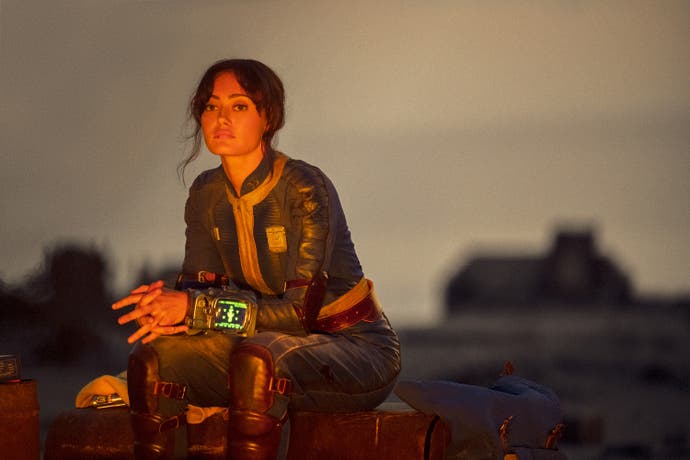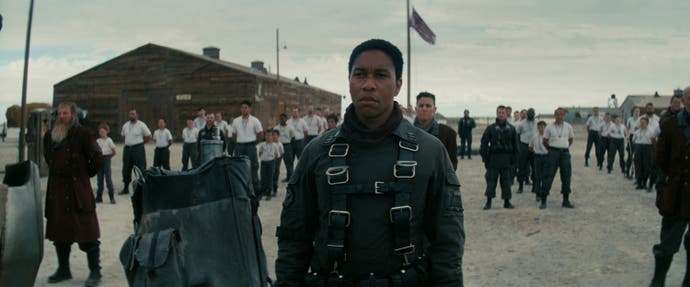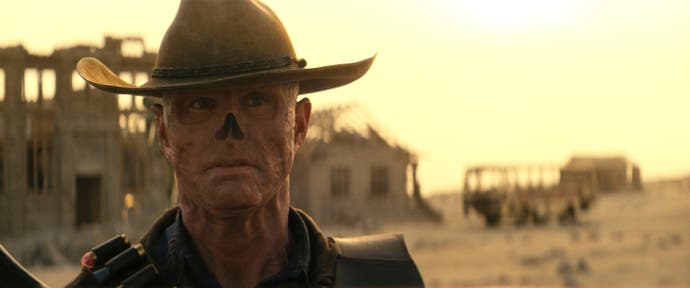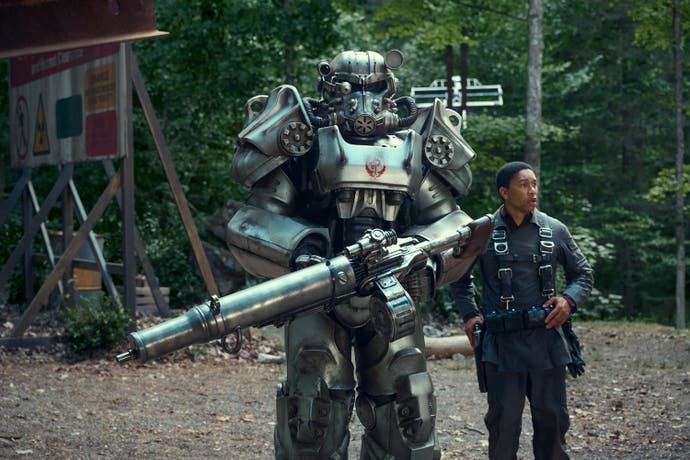Fallout season 1 review - a wild Wasteland safari where naive optimism meets gory mayhem
Cooped up.
Boom time: whether by accident or design, the Fallout TV show - announced in 2020 and arriving in a binge-ready eight-episode payload this week - is launching at an auspicious moment. After the mushrooming success of HBO's The Last of Us, screen adaptations of video games have never been hotter or more respectable. Similarly, the lingering impact of Oppenheimer, now forever glowing with Oscar acclaim, means the world has had atomic bombs on the brain since last summer.
But transferring Fallout's hardscrabble post-nuclear pleasures to the small screen presents a problem similar to Fallout inventory management. With such an abundance of material and only so much capacity, what do you keep and what do you throw away? The good news is that the Prime Video adaptation cannily lifts the franchise's road-tested production design - refined over the course of six core titles spanning two decades - completely wholesale.
Of course they were going to keep the snazzy blue jumpsuits, hulking Brotherhood of Steel power armour and the vast, clanking, cog-shaped Vault doors that resemble a particularly intimidating Early Learning Centre playset teaching toddlers how gears work. Those are all cool as hell. But there are other visual callbacks to the games in practically every frame of this deluxe Prime Video adaptation, from Nuka-Cola bottle caps to the strangely comforting sight of two-headed Brahmin cows.
Will these medium-to-deep pulls mean much to the casual viewer simply looking for a Mad Max-adjacent streaming stopgap while they wait for season two of TLOU? Probably not, but every authentic click from a Pip-Boy feels like part of a concerted attempt to reassure hardcore Fallout heads that this monumental game series is in respectful hands.
Those fans might have been nervous when Amazon first announced the project would be overseen by Jonathan Nolan and Lisa Joy, the rising Hollywood power couple whose previous big sci-fi swing was HBO's sixguns-and-sexbots drama Westworld. That show was absolutely ravishing to look at but agonising to unpack: a lofty jumble of artificial intelligence buzzwords and unscrupulous timeline chicanery. There were certainly no jokes in its antiseptic vision of the future.
Nolan and Joy's preferred mode of operation appeared to be chilly, cryptic and nominally cerebral. Could that work with something as narratively down-and-dirty but satirically heightened as Fallout? (A less pressing question: during production, did Jonathan ever discuss nuclear cataclysms with big brother Christopher?)

There are two distinct strains of humour baked into the Fallout games. There is the ironic juxtaposition of pre-apocalypse golly-gosh 1950s atomic optimism and the shattered reality of a Wasteland full of toilet seats and radroaches. But there is also the emergent slapstick that comes from actually playing, where low-level skirmishes abruptly turn into chaotic, cack-handed free-for-alls and raider heads blossom into fountains of bloody dogmeat with the help of V.A.T.S. targeting.
Being funny is a core part of Fallout's DNA and to their credit, producers Nolan and Joy - along with writers and showrunners Geneva Robertson-Dworet and Graham Wagner - have fully embraced every aspect of it. It helps that their lead character Lucy (Ella Purnell) is a sheltered vault dweller who suddenly has to adapt to surviving the Wasteland. Squint a bit and the wide-eyed Lucy acts like someone who literally has no idea how to play Fallout.
Most of the series takes place 219 years after an atomic bombardment flattened California and, presumably, the rest of the US. Lucy has been raised in the pristine Vault 33, a shining model of democracy where she spends her days racking up scout badges in various disciplines of good citizenship. Some day, when the rads have subsided and Vault 33 pops its cork, she is expected to bring civilising values to the surface.

Her surface-dwelling mirror is Maximus (Aaron Morten), an equally young Brotherhood of Steel initiate apparently trapped in the first half of Full Metal Jacket, mercilessly bullied by his fellow grunts but genuinely awed by the Brotherhood's military might (embodied by tiltwing dropships and Knights clanking about in bulky armour). Neither of these kids seem truly ready to face the cynical realities of the Wasteland but that is where they find themselves by the end of the first episode.
The world-weary wild card is Walton Goggins as a gunslinging ghoul with a mercenary streak. We first meet Goggins pre-apocalypse as charismatic cowboy turned toothy western movie star Coop Howard, a loving husband and father trying to navigate a Hollywood red scare while the Vault-Tec corporation grows in influence. As the rather more pragmatic ghoul, Goggins is an icy, self-amused killer, radiating malevolence even under heavy prosthetics and a distinctive CGI nose job.
If his Justified co-star Timothy Olyphant has made a career out of playing lanky cowboys - most recently as a sharp-shooting space marshall in The Mandalorian - Goggins relishes the opportunity to go full Clint in a tattered duster. His bandolier of chunky customised ammo helps lock in Fallout's tone of precarious survival punctuated by sudden and often gruesome ultraviolence. He also get most of the best lines, such as his knowing golden rule of the Wasteland: "Thou shalt get sidetracked by bullshit every goddamn time."

These three characters are all in search of a MacGuffin amid the ruins of California and while their allegiances shift depending on the circumstances, their moment-to-moment motivation remains refreshingly clear. Aside from one mid-season rug-pull, Fallout's main mystery - how did it all come to this? - hums in the background via the Coop flashbacks and Lucy's diminutive brother Norm (Moisés Arias) staying behind and picking away at the picket-fence utopia of Vault 33.
Whether this incarnation of Fallout chimes with you may well depend on whether you can roll with its whiplash changes in tone. At times, it looks like the most gorgeous widescreen, windswept, desert sci-fi: you could easily splice together a trailer to rival Dune: Part Two. But that epic tone is continuously undercut by Mr Bean-style mishaps: a limb blown off, a bout of projectile vomiting, a sneak attack by terrifying Wasteland wildlife. One episode opens with newborn puppies literally being thrown into an incinerator, just in case you aren't sure who the bad guys are.
If not for the runaway success of the similarly gruesome The Boys, perhaps Prime Video would not have signed off on all the splatter and swearing. But the surprisingly subtle trick that Fallout pulls off is that, aside from the odd slo-mo shootout, the brutality rarely feels like the point. Most of the leads genuinely seem to be trying their best in difficult circumstances.
There has been a glut of viscerally violent streaming comedy in recent years, from The Boys to Preacher and Peacemaker. But ultimately what Fallout put me in mind of was Dungeons and Dragons: Honour Among Thieves, a rollicking movie romp with likeable characters that managed to evoke the improvisational, seat-of-the-pantaloons spirit of actually playing D&D. Fallout does something similar, its gory scenes evoking the sort of accidental escalations that routinely happen in the game. What a lovely, if blood-spattered, surprise.
Season one of Fallout launches on Prime Video from 11th April.


